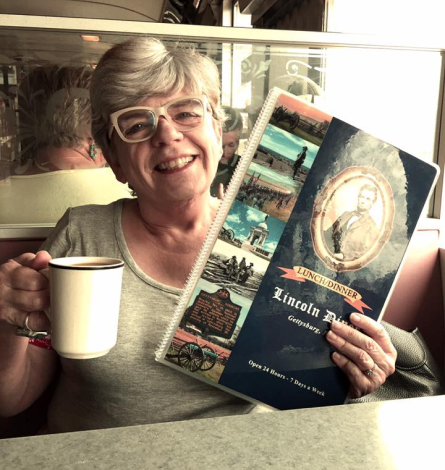You all have strict orders from me to drive safely, eat lots of watermelon and hot dogs, and get yourselves ready to read a good book!
It’s a fine and natural thing to remember those who have gone before.
I’m thinking today of my Grandma Wiley. She wasn’t a blood grandmother, but she certainly filled the role, just the same.
She had spirit, I’m here to tell you.
Grandma was raised outside of Coffeyville, Kansas–I hope I spelled that right–and used to tell me about the day the Dalton brothers tried to rob the bank. They were a bad bunch of hombres, those Daltons. Nothing glamorous about them. Their plans went awry, because some of the locals got wind of the plan ahead of time, and they were laying for the outlaws when they rode in. With rifles and no sense of humor. Shot them dead, those ranchers and townspeople–Grandma heard the shots, clear out on the farm–strapped the bodies to boards, and propped them up along the sidewalk on the main street of town. Grandma’s father was ahead of his time, and he said “no child of mine is going to look at something like that”, but a lot of people took in the grisley spectacle. Maybe they thought their children would be scared straight, but my money is on Great Grandpa. Talk about a lifetime of bad dreams. (There’s a scene in McKettrick’s Choice, coming Tuesday, based on this.)
I’ll tell you more about Grandma, too. She used a real wood-powered cookstove, and it appears in every western I write. It’s always in the same corner of the kitchen. As a small child, I thought the thing was magic. The best pies, cakes and biscuits you ever tasted came out of that stove.
And once, back in Coffeyville, a man rode up to the gate and her (Grandma’s) father went down to greet him, as was customary in those days. After a brief conversation, the rider proceeded to the barn, where he fed, groomed and watered his horse, then bedded down for the night. When Great Grandpa got back to the house, everybody was curious. Most folks would have come inside for supper and some visiting, but the rider had refused, albeit politely. He was trying to keep a low profile, I guess. Probably a good thing, since his name was Jessie James.


About Linda
The daughter of a town marshal, Linda Lael Miller is a #1 New York Times and USA TODAY bestselling author of more than 100 historical and contemporary novels, most of which reflect her love of the West.
Raised in Northport, Washington, Linda pursued her wanderlust, living in London and Arizona and traveling the world before returning to the state of her birth to settle down on a horse property outside Spokane.



